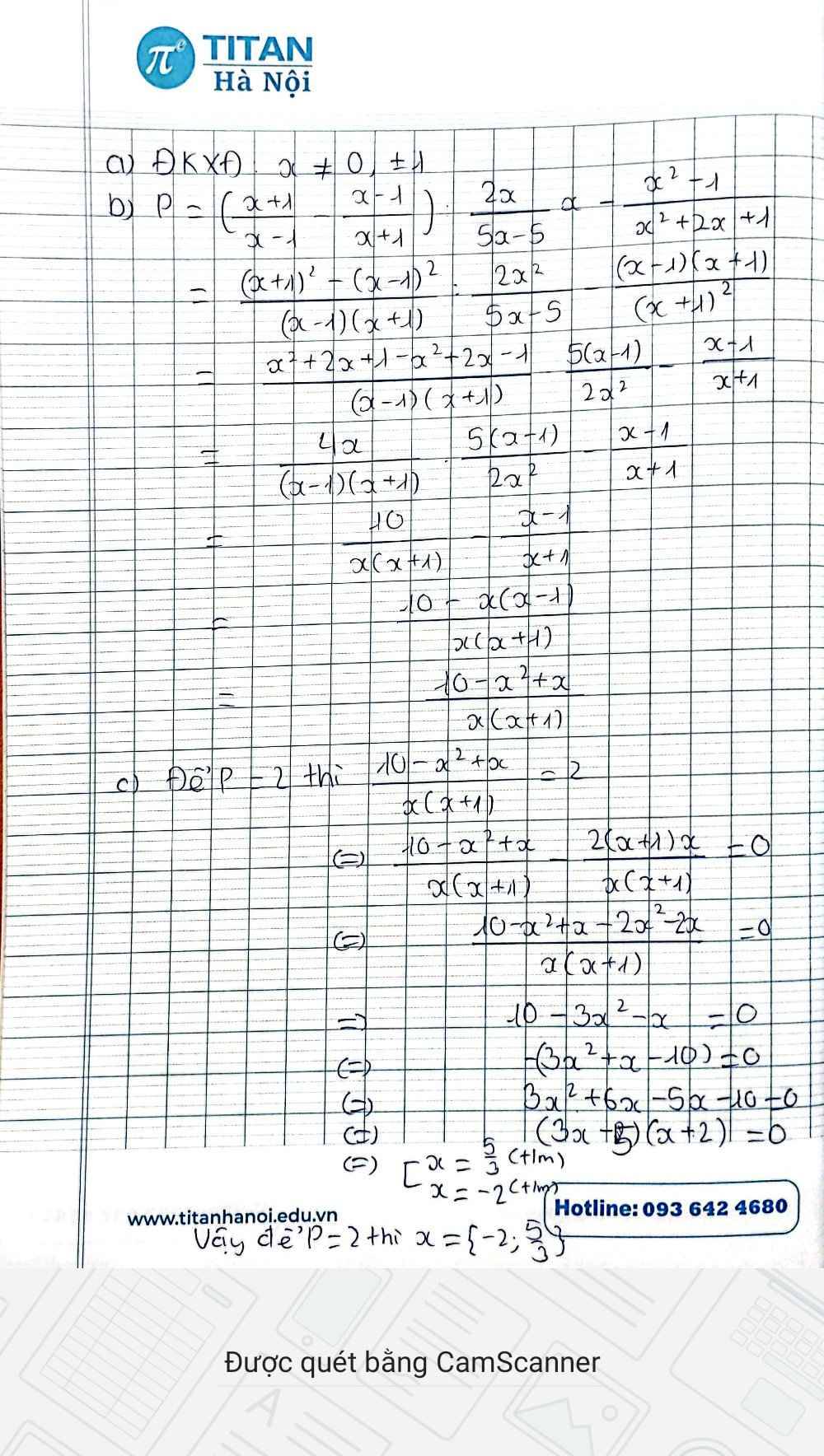Hãy nhập câu hỏi của bạn vào đây, nếu là tài khoản VIP, bạn sẽ được ưu tiên trả lời.

a: ĐKXĐ: \(x\notin\left\{1;-1\right\}\)
b: \(P=\dfrac{x}{2\left(x-1\right)}-\dfrac{x^2+1}{2\left(x-1\right)\left(x+1\right)}=\dfrac{x^2+x-x^2-1}{2\left(x-1\right)\left(x+1\right)}=\dfrac{1}{2x+2}\)

a, ĐKXĐ: x\(\ne\)5, x\(\ne\)0, x\(\ne\)-5
b, B = \(\frac{x^2+2x}{2x+10}+\frac{x-5}{x}+\frac{50-5x}{2x\left(x+5\right)}\)
= \(\frac{x^3+2x^2}{2x\left(x+5\right)}+\frac{2\left(x+5\right)\left(x-5\right)}{2x\left(x+5\right)}+\frac{50-5x}{2x\left(x+5\right)}\)
=\(\frac{x^3+2x^2}{2x\left(x+5\right)}+\frac{2x^2-50}{2x\left(x+5\right)}+\frac{50-5x}{2x\left(x+5\right)}\)
= \(\frac{x^3+2x^2+2x^2-50+50-5x}{2x\left(x+5\right)}\)
=\(\frac{x\left(x^2+4x-5\right)}{2x\left(x+5\right)}\)=\(\frac{x\left(x^2+4x-5\right)}{2x\left(x+5\right)}\)=\(\frac{x-1}{2}\)
Với B = 0 thì\(\frac{x-1}{2}\)=0 => x = 1
Với B = \(\frac{1}{4}\)thì \(\frac{x-1}{2}\)=\(\frac{1}{4}\)=> x = 1,5

Câu 1 :
a) ĐKXĐ : \(\hept{\begin{cases}x+1\ne0\\2x-6\ne0\end{cases}}\) \(\Leftrightarrow\hept{\begin{cases}x\ne-1\\x\ne3\end{cases}}\)
b) Để \(P=1\Leftrightarrow\frac{4x^2+4x}{\left(x+1\right)\left(2x-6\right)}=1\)
\(\Leftrightarrow\frac{4x^2+4x-\left(x+1\right)\left(2x-6\right)}{\left(x+1\right)\left(2x-6\right)}=0\)
\(\Rightarrow4x^2+4x-2x^2+4x+6=0\)
\(\Leftrightarrow2x^2+8x+6=0\)
\(\Leftrightarrow x^2+4x+4-1=0\)
\(\Leftrightarrow\left(x+2-1\right)\left(x+2+1\right)=0\)
\(\Leftrightarrow\orbr{\begin{cases}x+1=0\\x+3=0\end{cases}}\) \(\Leftrightarrow\orbr{\begin{cases}x=-1\left(KTMĐKXĐ\right)\\x=-3\left(TMĐKXĐ\right)\end{cases}}\)
Vậy : \(x=-3\) thì P = 1.

\(B=\frac{x^2-2}{x^2+1}=\frac{x^2+1-3}{x^2+1}=1-\frac{3}{x^2+1}\)
\(B_{min}\Rightarrow\left(\frac{3}{x^2+1}\right)_{max}\Rightarrow\left(x^2+1\right)_{min}\)
\(x^2+1\ge1\). dấu = xảy ra khi x2=0
=> x=0
Vậy \(B_{min}\Leftrightarrow x=0\)
ta có: \(x^2+2x-2=x^2+2x+1^2-3=\left(x+1\right)^2-3\ge-3\)
dấu = xảy ra khi \(x+1=0\)
\(\Rightarrow x=-1\)
Vậy\(\left(x^2+2x-2\right)_{min}\Leftrightarrow x=-1\)

a, ĐKXĐ: \(x\ne0;x\ne\pm1\)
\(P=\left(\frac{2x}{x^2-1}+\frac{x-1}{2x+2}\right):\frac{x+1}{2x}=\left(\frac{2x}{\left(x-1\right)\left(x+1\right)}+\frac{x-1}{2\left(x+1\right)}\right):\frac{x+1}{2x}\)
\(=\left(\frac{2x.2}{2\left(x-1\right)\left(x+1\right)}+\frac{\left(x-1\right)^2}{2\left(x-1\right)\left(x+1\right)}\right):\frac{x+1}{2x}\)
\(=\frac{4x+x^2-2x+1}{2\left(x-1\right)\left(x+1\right)}:\frac{x+1}{2x}=\frac{x^2+2x+1}{2\left(x-1\right)\left(x+1\right)}=\frac{\left(x+1\right)^2}{2\left(x-1\right)\left(x+1\right)}\cdot\frac{2x}{x+1}=\frac{x}{x-1}\)
b,Để \(P=2\Leftrightarrow\frac{x}{x-1}=2\Leftrightarrow2\left(x-1\right)=x\Leftrightarrow2x-2-x=0\Leftrightarrow x-2=0\Leftrightarrow x=2\left(tmđk\right)\)
Vậy để P=2 <=> x=2